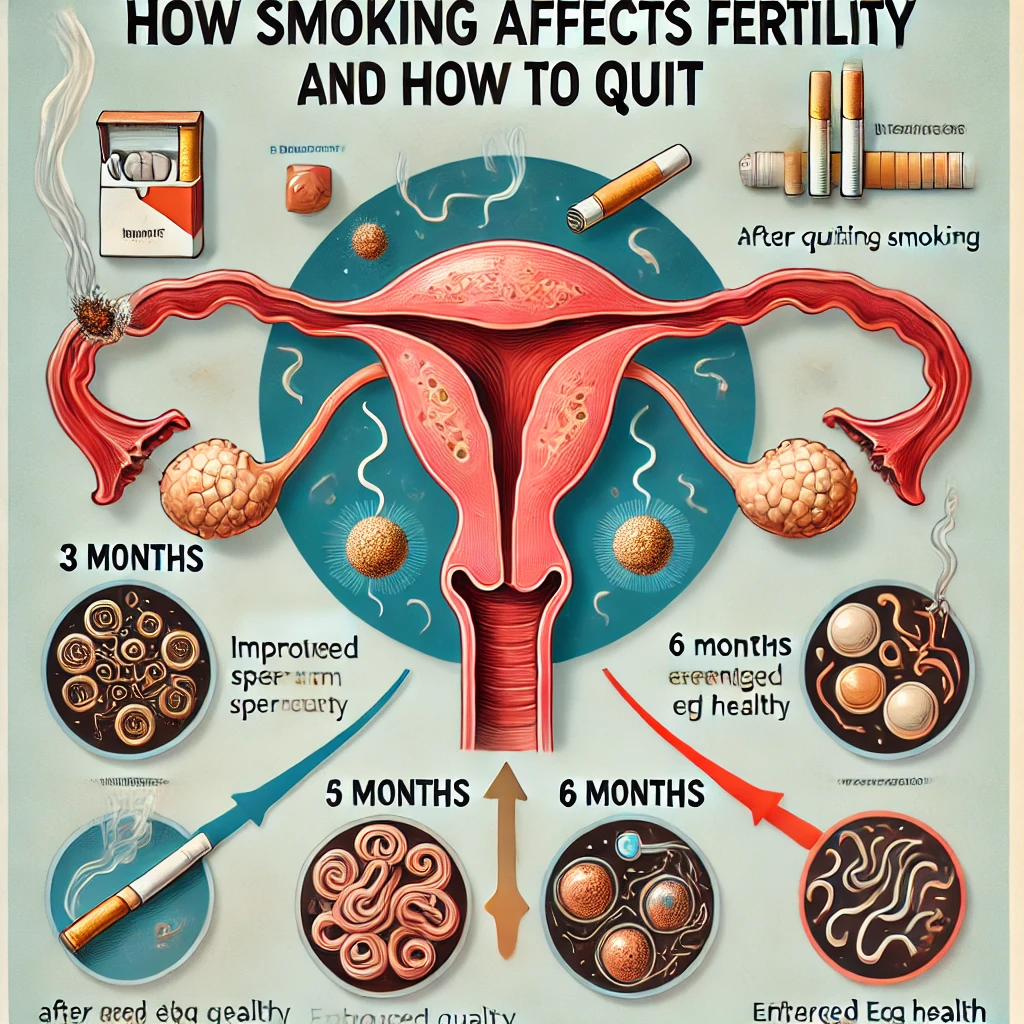Smoking is a known health hazard, linked to diseases like lung cancer, heart disease, and respiratory issues, also its detrimental impact on fertility is often overlooked, whether you are trying to conceive or planning for the future, understanding how smoking affects reproductive health and how to quit is important.
This article explores the relationship between smoking and fertility, the risks involved, and effective strategies to quit.
How Smoking Affects Fertility
For Women
Reduced Egg Quality
- Smoking accelerates the loss of eggs and damages their quality, making conception more difficult.
Hormonal Imbalances
- Smoking disrupts hormone production, interfering with ovulation and menstrual cycles.
Increased Risk of Ectopic Pregnancy
- Tobacco toxins damage the fallopian tubes, increasing the risk of an embryo implanting outside the uterus.
Premature Ovarian Aging
- Women who smoke are more likely to experience early menopause, reducing their reproductive window.
Reduced Success with Fertility Treatments
- Smokers have lower success rates with assisted reproductive technologies like IVF.
For Men
Reduced Sperm Count
- Smoking lowers the number of sperm produced, decreasing the chances of fertilization.
Poor Sperm Quality
- Smoking damages sperm DNA, leading to reduced motility (movement) and morphology shape.
Erectile Dysfunction
- Smoking restricts blood flow, increasing the likelihood of erectile dysfunction.
Hormonal Changes
- Smoking decreases testosterone levels, affecting libido and sperm production.
- (Is Shisha harming your health more than you think? Uncover the hidden dangers!
(Read More Here)
How Smoking Affects Fertility in Both Partners
- Secondhand Smoke. Non smoking partners exposed to secondhand smoke may experience similar fertility challenges.
- Pregnancy Risks. Smoking during pregnancy increases the risk of miscarriage, preterm birth, and low birth weight.
Long Term Reproductive Health Risks of Smoking
- Infertility. Prolonged smoking increases the likelihood of infertility in both men and women.
- Genetic Damage. Tobacco toxins can cause genetic mutations in eggs and sperm, potentially affecting future offspring.
- Pregnancy Complications. Smokers are more prone to complications such as placental issues and fetal development problems.
How to Quit Smoking for Better Fertility
Quitting smoking is one of the best steps you can take to improve fertility and overall health, here is how to start.
1. Understand Your Triggers
- Identify situations, emotions, or habits that prompt you to smoke.
- Replace these triggers with healthier alternatives, such as chewing gum, exercising, or meditating.
2. Set a Quit Date
- Choose a specific date to quit and prepare yourself mentally and physically.
- Inform friends and family for support.
3. Use Nicotine Replacement Therapy (NRT)
- Products like nicotine patches, gums, and lozenges can help reduce withdrawal symptoms.
- Consult your doctor for guidance on the right NRT for you.
4. Seek Professional Support
- Join smoking cessation programs or counseling groups.
- Many healthcare providers offer resources to help you quit.
5. Adopt Healthy Habits
- Replace smoking with activities that support fertility, such as eating a balanced diet, staying active, and reducing stress.
- Avoid alcohol and caffeine, as these can act as triggers.
6. Consider Prescription Medications
- Certain medications, such as varenicline or bupropion, can help reduce cravings and withdrawal symptoms.
7. Stay Persistent
- Relapses can happen; use them as learning experiences and recommit to quitting.
- Reward yourself for milestones achieved during the quitting process.
How Quitting Smoking Improves Fertility
- Women. Quitting restores hormonal balance, improves egg quality, and enhances the success of fertility treatments.
- Men. Sperm count, motility, and morphology improve within three months of quitting.
- Both Partners. A smoke free environment increases the chances of conception and ensures a healthier pregnancy.
Additional Tips for Improving Fertility
Eat a Fertility Boosting Diet
- Include foods rich in antioxidants, vitamins, and minerals.
- Avoid trans fats and highly processed foods.
Exercise Regularly
- Engage in moderate exercise to maintain a healthy weight and improve blood circulation.
Manage Stress
- Practice mindfulness, yoga, or other stress relief techniques to support hormonal balance.
Limit Exposure to Toxins
- Reduce contact with environmental toxins, including air pollution and harmful chemicals.
Final Thoughts
Smoking significantly affects fertility in both men and women, but the good news is that quitting can reverse much of the damage, by understanding the risks and adopting healthier habits, you can improve your chances of conceiving and pave the way for a healthier future.
If you are ready to quit smoking, remember, every step toward a smoke free life is a step toward better fertility and overall health.
Have questions or tips about quitting smoking? Share them in the comments below and let’s support each other on the journey to better health.

